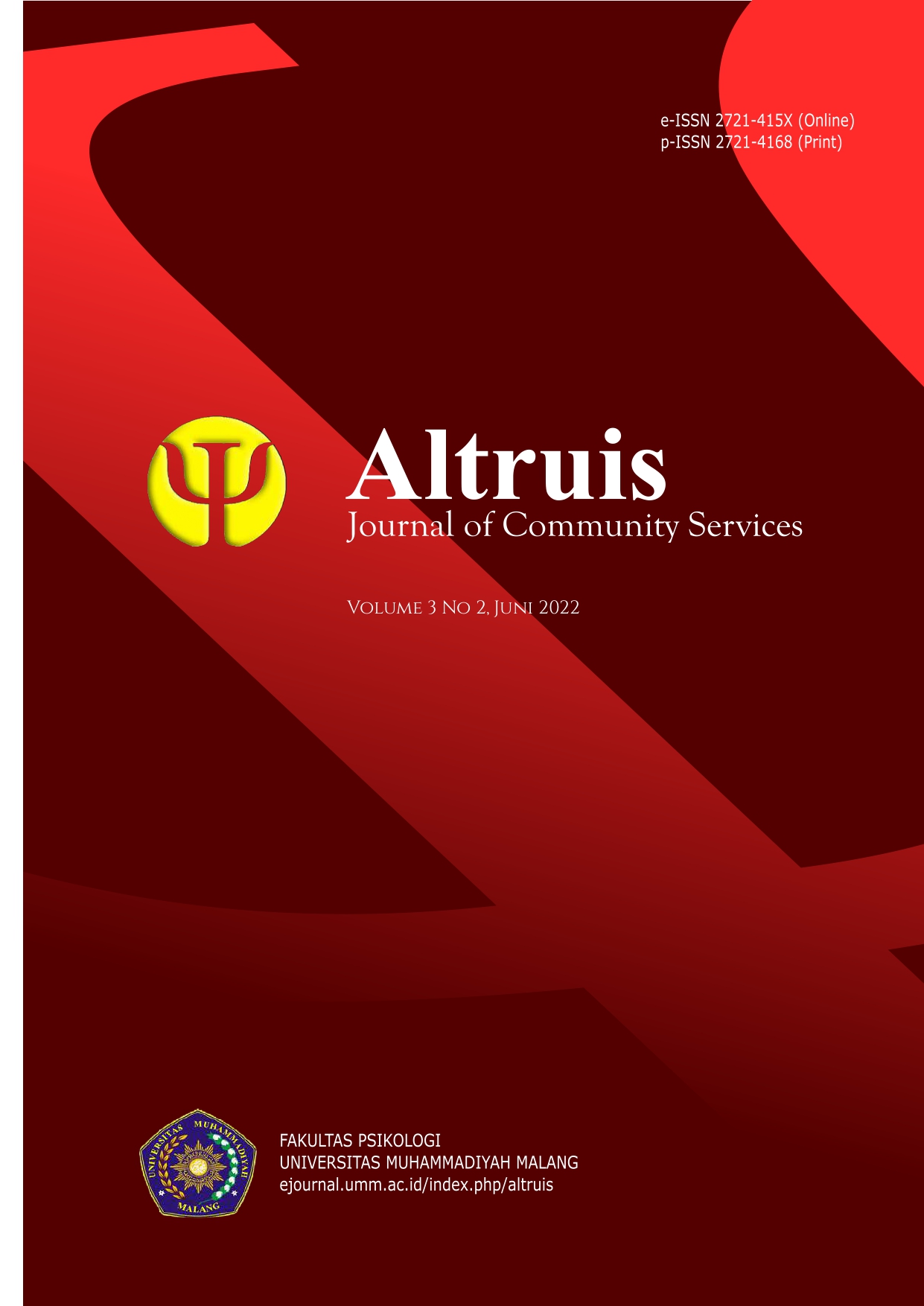Sosialisasi etika bermedia sosial pada siswa SMK Muhammadiyah Parung, Kabupaten Bogor
DOI:
https://doi.org/10.22219/altruis.v3i2.20862Keywords:
Harmful content, Hate speech, Hoax, Social mediaAbstract
The development of information technology today tends not to be controlled because of situations and conditions requiring conformity with science and technology development. The younger generation needs to be given the education to filter the impact of developing technology, especially the use of social media that contains Negative Content, Hoaxes, and Hate Speech. There are three stages in socializing ethics with social media: the preparation, implementation, and evaluation stages. The results of the socialization of students understand material related to social media ethics, harmful content, hoaxes, and hate speech. At the same time, the social media that are often used are dominated by WhatsApp, Instagram, and Facebook.
Downloads
References
Adit, A. (2021). 6 dampak negatif media sosial, siswa wajib hati-hati. https://edukasi.kompas.com/read/2021/05/28/060700871/6-dampak-negatif-media-sosial-siswa-wajib-hati-hati?page=all
Agustiah, D., Fauzi, T., & Ramadhani, E. (2020). Dampak penggunaan media sosial terhadap perilaku belajar siswa. Islamic Counseling: Jurnal Bimbingan Konseling Islam, 4(2), 181. https://doi.org/10.29240/jbk.v4i2.1935
Akram, W., & Kumar, R. (2017). A study on positive and negative effects of social media on society. International Journal of Computer Sciences and Engineering, 5(10), 351–354. https://doi.org/10.26438/ijcse/v5i10.351354
Bina, M. A. H. (2020). Fenomena hate speech di media sosial dan konstruk sosial masyarakat. Jurnal Peurawi: Media Kajian Komunikasi Islam, 4(1), 92–100. http://dx.doi.org/10.22373/jp.v4i1.8814
Fensi, F. (2020). Peran media sosial dalam pembentukan karakter siswa SMA & SMK Bhinneka Tunggal Ika, Jakarta. Jurnal Pengabdian Dan Kewirausahaan, 4(2), 82–88. https://doi.org/10.30813/jpk.v4i2.2325
Gagliardone, Iginio, Gal, D., Alves, T., & Martinez, G. (2015). Countering Online Hate Speech. https://unesdoc.unesco.org/ark:/48223/pf0000233231
Harjanto, A., Karnila, S., & Nugraha, F. (2018). Rancang bangun aplikasi sistem pakar untuk konsultasi perilaku siswa di sekolah menggunakan metode forward chaining. Simetris: Jurnal Teknik Mesin, Elektro Dan Ilmu Komputer, 9(2), 817–824. https://doi.org/10.24176/simet.v9i2.2367
Iswanto, H. F., Anggraeni, R., Kartikasari, R., Bahij, A. T. B., & Kadarwati, S. (2021). Pelatihan bijak bermedia sosial sebagai upaya pendidikan karakter pada remaja. Jurnal Abdimas, 25(2), 197–206. https://doi.org/10.15294/abdimas.v25i2.32993
Kemp, S. (2021). Digital 2021: the latest insights into the ‘state of digital.’ https://wearesocial.com/uk/blog/2021/01/digital-2021-the-latest-insights-into-the-state-of-digital/
Meilinda, N., Malinda, F., & Aisyah, S. M. (2020). Literasi digital pada remaja digital (sosialisasi pemanfaatan media sosial bagi pelajar sekolah menengah atas). Jurnal Abdimas Mandiri, 4(1), 62–69. https://doi.org/10.36982/jam.v4i1.1047
Parhan, M., Jenuri, & Islamy, M. R. F. (2021). Media sosial dan fenomena hoax: tinjauan islam dalam etika bekomunikasi. Communicatus: Jurnal Ilmu Komunikasi, 5(1), 59–80. https://doi.org/10.15575/cjik.v5i1.12887
Pemerintah Indonesia. (2016). Undang-undang Republik Indonesia Nomor 19 Tahun 2016. Presiden Republik Indonesia: Jakarta.
Rofii, A., Herdiawan, R. D., Nurhidayat, E., Fakhrudin, A., Sudirno, D., & Nahdi, D. S. (2021). Penyuluhan tentang bahaya pergaulan bebas dan bijak bermedia sosial . BERNAS: Jurnal Pengabdian Kepada Masyarakat, 2(4), 825-832. https://doi.org/10.31949/jb.v2i4.1588
Rejeki, S. R. I., & Kristiani, D. W. I. (2021). Sosialisasi literasi media sosial kepada masyarakat Dukuh Tanuwangsan, Mojolegi, Teras, Boyolali. Jurnal Ekonomi, Sosial & Humaniora, 2(10), 9–14.
Riyanto, D. (2019). Perilaku bermedia sosial di kalangan mahasiswa santri pondok pesantren Thoriqul Huda. Tesis: Tidak dipulikasikan.
Widodo, W., Budoyo, S., Pratama, T. G. W., & Soeprijanto, T. (2019). Hoax di Indonesia : Suatu kajian. Jurnal Meta-Yuridis, 2(1), 69–78. https://doi.org/https://doi.org/10.26877/m-y.v2i2.4691
Downloads
Published
How to Cite
Issue
Section
License
Copyright (c) 2022 Fajar Adi Prakoso

This work is licensed under a Creative Commons Attribution-ShareAlike 4.0 International License.
Authors who publish in Altruis agree to the following terms:
- For all articles published in Altruis, copyright is retained by the authors. Authors give permission to the publisher to announce the work with conditions. When the manuscript is accepted for publication, the authors agree to automatic transfer of the publishing right to the publisher.
- Authors retain copyright and grant the journal right of first publication with the work simultaneously licensed under a Creative Commons Attribution-ShareAlike 4.0 International License that allows others to share the work with an acknowledgment of the work's authorship and initial publication in this journal.
- Authors are able to enter into separate, additional contractual arrangements for the non-exclusive distribution of the journal's published version of the work (e.g., post it to an institutional repository or publish it in a book), with an acknowledgment of its initial publication in this journal.
- Authors are permitted and encouraged to post their work online (e.g., in institutional repositories or on their website) prior to and during the submission process, as it can lead to productive exchanges, as well as earlier and greater citation of published work (See The Effect of Open Access).
This work is licensed under a Creative Commons Attribution-ShareAlike 4.0 International License.


